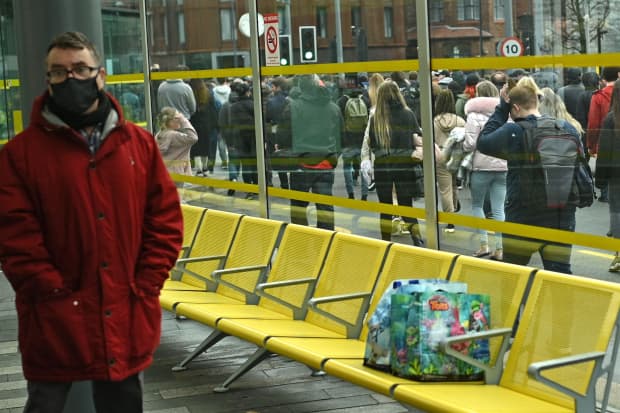This post was originally published on this site

A man wearing a protective face covering to combat the spread of the coronavirus waits inside the bus station a protesters march past during an anti-vax rally and protest against vaccination and government restrictions designed to control or mitigate the spread of the novel coronavirus, including the wearing of masks and lockdowns, in Liverpool on November 14, 2020.
oli scarff/Agence France-Presse/Getty Images
European stocks headed lower Thursday, continuing a choppy pattern this week of reacting to news about the effectiveness of vaccines against coronavirus as well as tightening restrictions in response to the spreading virus.
Up 0.4% on Wednesday, the Stoxx Europe 600 SXXP, -0.90% dropped 0.7%, with French oil group Total FP, -2.07% and Swiss engineering group ABB ABBN, -3.24% among the decliners.
The German DAX DAX, -0.88%, French CAC 40 PX1, -0.87% and U.K. FTSE 100 UKX, -0.94% each saw similar declines.
U.S. stock futures ES00, -0.41% drifted after a 345-point drop for the Dow Jones Industrial Average DJIA, -1.15% on Wednesday.
U.S. hospitalizations for COVID-19 reached a fresh record of 79,410 on Thursday, according to the COVID tracking project, as New York City shut its schools.
An analysis of Google Mobility data on a 7-day average by BNP Paribas found Western Europe was the most affected region by the second wave, with activity 30 percentage points below baseline, though that’s not as bad as the 55-point drop in April. The U.S. has been fairly steady at nearly 20 percentage points below baseline.
The pandemic emergency purchase program and targeted longer-term refinancing operations are likely to remain the main tools for adjusting European Central Bank policy, said President Christine Lagarde on Thursday. Lagarde reiterated the ECB would “recalibrate its instruments” as appropriate at its December meeting.
After the close, European leaders will discuss the €750 billion recovery fund, and whether Hungary and Poland will relinquish their veto of it. “We expect the two Central European member states to concede and remove their vetoes – perhaps in return for some kind of non-binding political declaration – if only because their government budgets will be the biggest losers (at the cost of about 11% of GDP each) if the other member states press ahead without them,” said Chris Scicluna, head of research for Daiwa in London.
Royal Mail RMG, +6.50% shares jumped 7% as the postal service and courier company hiked its revenue guidance after reporting an 88% drop in adjusted pretax profit in the six months to Sept. 27.
German forklift maker Kion KGX, -9.34% dropped 9% after saying it would issue 11% more shares, at a price still to be determined.
ThyssenKrupp TKA, -6.56% shares dropped 6% as the company said it would cut 7,400 jobs. The German steelmaker forecast adjusted loss before interest and tax in the mid three-digit million euro range, after losing €1.6 billion euro before interest and tax on an adjusted basis in the year to Sept. 30.

